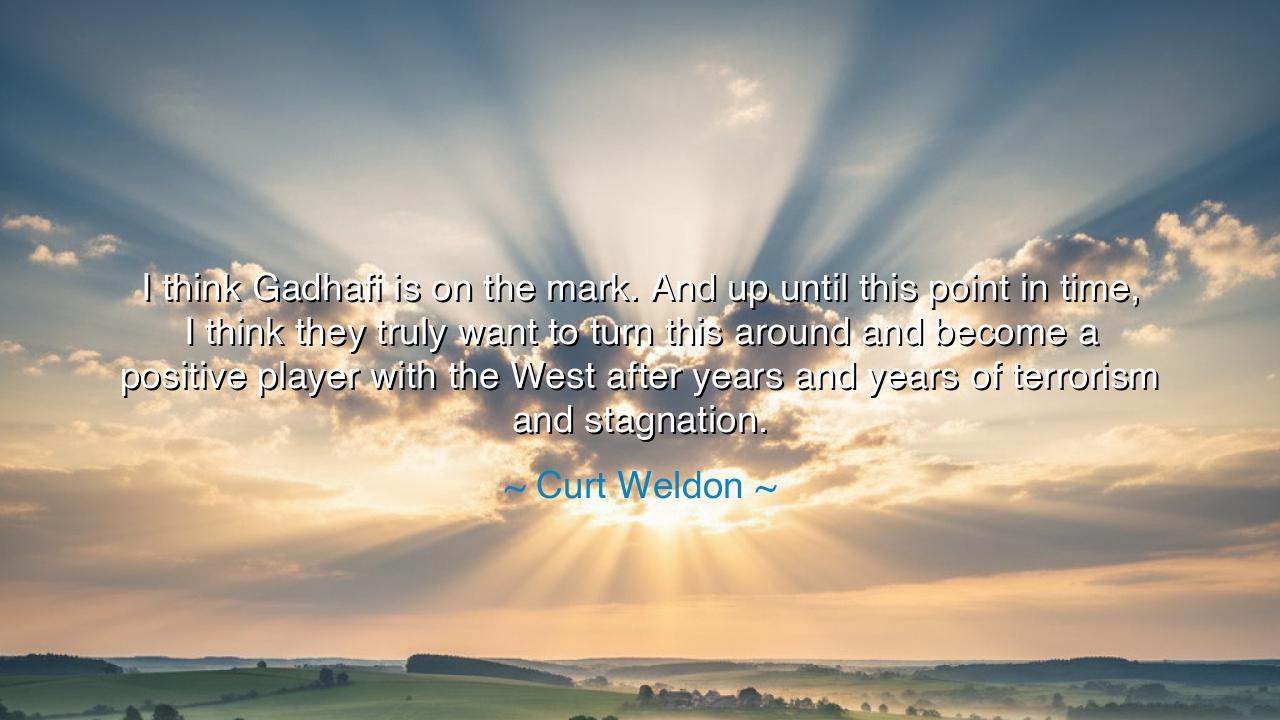
I think Gadhafi is on the mark. And up until this point in time
I think Gadhafi is on the mark. And up until this point in time, I think they truly want to turn this around and become a positive player with the West after years and years of terrorism and stagnation.






Hear the solemn judgment of Curt Weldon: “I think Gadhafi is on the mark. And up until this point in time, I think they truly want to turn this around and become a positive player with the West after years and years of terrorism and stagnation.” These words speak of transformation—the possibility that even those long lost in darkness may seek a return to light. In them lies both hope and warning: hope that nations and leaders may change, and warning that such change is fragile, and must be tested by deeds, not words.
The ancients too knew of such turning. Consider the tale of Ashoka the Great of India. Once he bathed his empire in blood, conquering ruthlessly in the war of Kalinga. But when he beheld the suffering he had wrought, his spirit was pierced with remorse. Casting aside the sword, he embraced the dharma, spreading Buddhism across Asia. Like Gadhafi seeking to shift from terrorism to peace, Ashoka’s transformation shows that even the mightiest can forsake destruction for harmony, becoming a positive player in the unfolding of history.
Yet such transformations are never swift. A land long sunk in stagnation bears scars that do not heal overnight. Trust once broken must be rebuilt stone by stone, through actions that endure beyond speeches. Weldon’s words carry this tension—the recognition of a desire for renewal, and the unspoken question of whether that renewal can truly last. For the world has seen many who promised peace but returned to violence, and many who claimed repentance but wore it as a mask.
Still, we must not despise the first step of change. Even a river polluted for centuries begins to cleanse itself with a single flow of fresh water. To recognize a desire for transformation, even from one with bloodstained hands, is to honor the possibility of redemption. For without belief in such a turning, no diplomacy, no reconciliation, no healing between enemies would ever be possible.
So let the generations remember: every age will face men and nations weighed down by their past, yet reaching toward a different future. It is easy to condemn forever, harder to believe in the power of renewal. Weldon’s words teach us to watch with cautious hope—to demand proof, but not to deny the chance for change. For history has shown, from Ashoka to Mandela, that those once feared as destroyers may yet rise as builders, if they choose to walk the path of light.






MTNguyen Manh Tien
While Weldon’s statement seems to reflect hope for Libya’s shift towards cooperation with the West, there are valid concerns about the sincerity of such a change. Can a regime with decades of terrorist activity and political stagnation simply turn things around, or is this a calculated move by Gadhafi? How much of this is about genuine reform, and how much is about positioning Libya for future advantages?
APAnh Phuong
Curt Weldon’s optimistic view of Gadhafi's intentions to be a 'positive player' in the West is intriguing, but I wonder how much it reflects wishful thinking rather than the reality of the situation. Given Gadhafi’s long history of antagonism, how much trust should the West place in his words? What actions can prove that Libya’s intentions have genuinely shifted, and not just changed for tactical reasons?
PNha phuong nguyen
Weldon’s quote raises an important question about how quickly the West is willing to forgive past actions if a country seems ready to change. But how much do we truly know about Gadhafi’s intentions? Is this about a strategic shift, or is it an opportunistic move to gain favor with the West? It’s difficult to overlook the years of tension and violence—can they really be forgotten so easily?
KDKhanh Duong
It’s interesting that Curt Weldon seems to support Gadhafi’s intentions, but how can we be sure that this shift is legitimate? Gadhafi has been a controversial figure, and while it’s important for countries to evolve, can a history of terrorism and conflict be so easily dismissed? I wonder if the West’s willingness to embrace Gadhafi is more about political convenience than genuine reform in Libya.
UGUser Google
Curt Weldon’s statement seems to suggest that Gadhafi’s actions have changed in a way that should be recognized as positive. But can we truly believe that a country with such a long history of terrorism and hostility can change its course that easily? How genuine is Gadhafi’s desire to become a positive player in the West? It’s a bold claim, but I wonder if it oversimplifies the complexity of the region’s political realities.